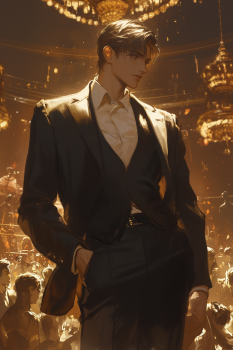Chapter 12
Benjamin Reed nodded, “Alright, what are you going to perform later? Should I play the supporting role for you?”
Samuel Parker shook his head, “There’s no time to rehearse the lines. I’ll do a solo act.”
……
When two people perform crosstalk, it’s a dialogue; when one person performs, it’s a monologue.
Samuel Parker made some brief preparations backstage and borrowed some “equipment”—fortunately, everything was available backstage.
In about twenty minutes, it would be Samuel Parker’s turn to go on. Benjamin Reed and his grandson led Henry Carter to the private box ahead of time to wait and watch.
Someone came on to announce the next act: up next is a crosstalk monologue, performed by jesse.
—No one knew what the announcer was thinking, using the English name instead of the Chinese one. But on second thought, Henry Carter’s son jesse was indeed more famous than Samuel Parker himself.
A staff member brought a table onto the stage, with a wooden clapper, folding fan, and other props on top.
Samuel Parker was still in his usual attire, walking unhurriedly to the table at the front of the stage.
He had just been on stage with Henry Carter earlier, and with his good looks, the audience had a strong impression of him. Some people had even seen Samuel Parker on variety shows and knew that, while he was good-looking, he was a bit wooden, so they started whispering among themselves.
The announcer said it was a crosstalk monologue—could this guy really do a solo act?
He’s good-looking and young, even his name is foreign. And now he’s going to perform crosstalk? That’s just too strange. [http://www.repanso.com] Baidu Cloud search engine, find novels, find movies, follow dramas.
If Samuel Parker came up to sing or dance, everyone would welcome it, just like earlier when he performed with Henry Carter—the performance was great, and just seeing his face made the ticket worth it.
The audience kept whispering, and they even knew how he behaved on TV.
In the private box, Benjamin Reed and Henry Carter saw the noisy audience and held their breath as they watched Samuel Parker. They could already foresee the difficulty Samuel Parker would face performing crosstalk—he was just too good-looking!
The audience was skeptical, their attention focused on Samuel Parker’s gossip and looks. How could they listen to what he had to say? No matter how wonderful the performance, wouldn’t the effect be diminished?
Samuel Parker stood still, glanced at the audience, and began to recite: “Lonely rivers and mountains stir with wine and sorrow, under the frosty sky and waning moon, sleepless through the night. Clay figures telling ghost stories, a common thing—let’s not discuss the rights and wrongs within!”
“Pa!” A crisp sound rang out as the wooden clapper struck the table, and the venue fell silent—no more noise.
This is called an opening poem. When performing a crosstalk monologue or storytelling, the performer usually recites a few lines of poetry after coming on stage to focus the audience’s attention.
The content might be lyrical, or it might introduce the story to follow, or simply be humorous to amuse the audience.
Samuel Parker enunciated clearly, his voice bright and resonant but not harsh, his stage presence steady. As he spoke, the audience unconsciously stopped talking. As Samuel Parker finished reciting the poem, one by one, everyone quieted down.
With the final strike of the wooden clapper—pa!—the room was silent. The opening poem had completely subdued the crowd!
Author’s note:
ps: The poem is from the preface of “Dong Ling Xiao Zhi,” with some changes for the plot. [http://www.pan58.com] Cloud drive resource search, cloud drive search tool (novels, movies, TV series)
Chapter Six
“From the look on your faces, I can tell—you’re all wondering, what’s this guy doing up here, looking like a foreign friend? Did the announcer make a mistake? Maybe he’s actually here to dance.” Samuel Parker spoke at a moderate pace, voicing the audience’s thoughts, and everyone smiled knowingly.
“Sigh, honestly, I didn’t want to come up either, but my mom insisted I show off a talent.” Samuel Parker knew Henry Carter was famous, so he used her as the butt of his joke. “Everyone knows my mom—gentle, beautiful. Growing up, my family never used corporal punishment. She always used her hands.”
He suddenly delivered a punchline. Since everyone was familiar with Henry Carter, and she had just performed, the audience burst out laughing, some even egging him on—wasn’t Henry Carter herself still in the teahouse?
With Henry Carter as the setup and Samuel Parker’s timing, something that was eight parts funny became ten.
“So, I had no choice but to come up here,” Samuel Parker said. “Otherwise, if she smacks her own head and goes out to accuse me of being unfilial, what then?”
The audience laughed even harder, and then let out a collective “eh?”
Just now, Samuel Parker said Henry Carter never used corporal punishment, only her hands—everyone laughed at the twist. But then his next line flipped it again, and the audience realized: Wait, so the hitting is hitting herself?!
If the logic isn’t twisted, it’s not funny—no one would really think Henry Carter was like that.
“Smacking her head to accuse you of being unfilial” is an old joke, but Samuel Parker gave it a fresh spin, making it just right.
“This kid…” Even Henry Carter herself, sitting in the private box, was torn between laughter and tears, but she also felt a bit of sweetness. After all, mother and son hadn’t been close for years, and her son was willing to use her as a punchline—she actually felt it was a kind of affection.
Usually, before the main act, crosstalk performers will say a few “opening remarks”—funny and entertaining introductions to warm up the atmosphere, spark the audience’s interest, and get a feel for their preferences so they can adjust the performance accordingly.
